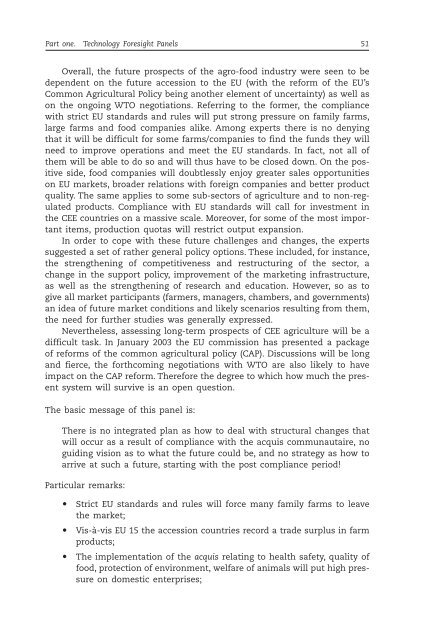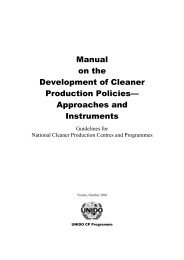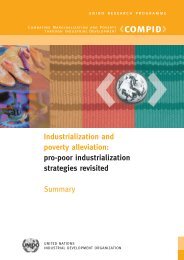TECHNOLOGY FORESIGHT SUMMIT - Unido
TECHNOLOGY FORESIGHT SUMMIT - Unido
TECHNOLOGY FORESIGHT SUMMIT - Unido
You also want an ePaper? Increase the reach of your titles
YUMPU automatically turns print PDFs into web optimized ePapers that Google loves.
Part one. Technology Foresight Panels 51<br />
Overall, the future prospects of the agro-food industry were seen to be<br />
dependent on the future accession to the EU (with the reform of the EU’s<br />
Common Agricultural Policy being another element of uncertainty) as well as<br />
on the ongoing WTO negotiations. Referring to the former, the compliance<br />
with strict EU standards and rules will put strong pressure on family farms,<br />
large farms and food companies alike. Among experts there is no denying<br />
that it will be difficult for some farms/companies to find the funds they will<br />
need to improve operations and meet the EU standards. In fact, not all of<br />
them will be able to do so and will thus have to be closed down. On the positive<br />
side, food companies will doubtlessly enjoy greater sales opportunities<br />
on EU markets, broader relations with foreign companies and better product<br />
quality. The same applies to some sub-sectors of agriculture and to non-regulated<br />
products. Compliance with EU standards will call for investment in<br />
the CEE countries on a massive scale. Moreover, for some of the most important<br />
items, production quotas will restrict output expansion.<br />
In order to cope with these future challenges and changes, the experts<br />
suggested a set of rather general policy options. These included, for instance,<br />
the strengthening of competitiveness and restructuring of the sector, a<br />
change in the support policy, improvement of the marketing infrastructure,<br />
as well as the strengthening of research and education. However, so as to<br />
give all market participants (farmers, managers, chambers, and governments)<br />
an idea of future market conditions and likely scenarios resulting from them,<br />
the need for further studies was generally expressed.<br />
Nevertheless, assessing long-term prospects of CEE agriculture will be a<br />
difficult task. In January 2003 the EU commission has presented a package<br />
of reforms of the common agricultural policy (CAP). Discussions will be long<br />
and fierce, the forthcoming negotiations with WTO are also likely to have<br />
impact on the CAP reform. Therefore the degree to which how much the present<br />
system will survive is an open question.<br />
The basic message of this panel is:<br />
There is no integrated plan as how to deal with structural changes that<br />
will occur as a result of compliance with the acquis communautaire, no<br />
guiding vision as to what the future could be, and no strategy as how to<br />
arrive at such a future, starting with the post compliance period!<br />
Particular remarks:<br />
<br />
<br />
<br />
Strict EU standards and rules will force many family farms to leave<br />
the market;<br />
Vis-à-vis EU 15 the accession countries record a trade surplus in farm<br />
products;<br />
The implementation of the acquis relating to health safety, quality of<br />
food, protection of environment, welfare of animals will put high pressure<br />
on domestic enterprises;

















